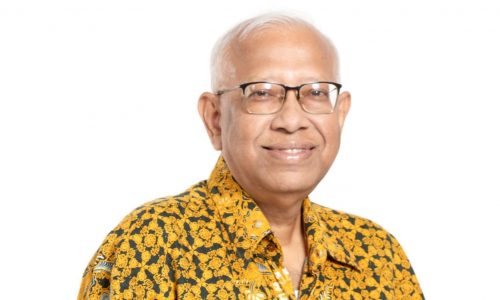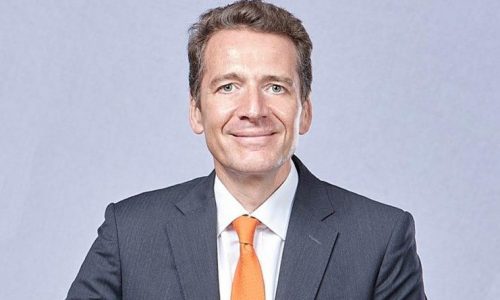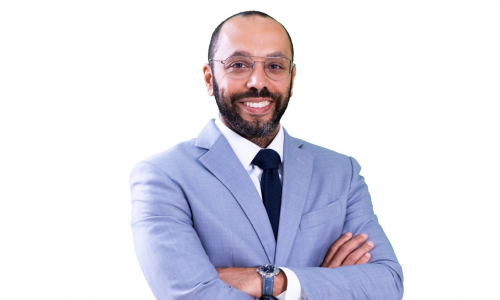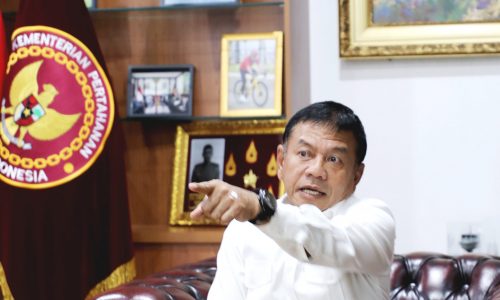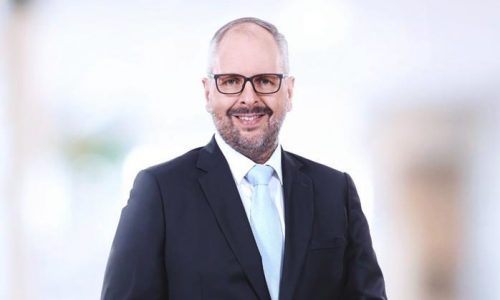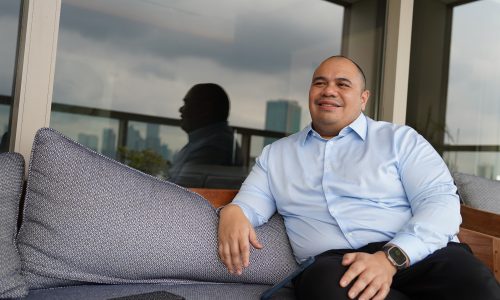Sebastien Gautier is the President of the Indonesian French Chamber of Commerce and Industry. He is also the Managing Partner at Mazars Indonesia. Recently, He sat with Indonesia Business Post to discuss the business potential in Indonesia, French-Indonesia relations, and the challenges in dealing with talents in this country.
Tell us about yourself and where you come from.
Sebastien Gautier, I’m 44 years old and a French national. I’ve been living in Indonesia for almost 17 years and working as a consultant and advisor in a French originated professional services firm, Mazars. We are providing services in audit and accounting as well as tax, financial advisory and consulting services. Besides Mazars, I’m also the President of the Indonesian French Chamber of Commerce and Industry, since mid 2022.
What is your story and how did you end up in Indonesia?
In 2006, I was working for KPMG Paris and was seconded to Indonesia to take care of one of their audit clients. It was supposed to be for a short period of time [two years], but very quickly I fell in love with the country and decided not to move back to Paris.
What has been the proudest moment, the biggest highlight of your life and career so far?
I would say Mazars has been one of my greatest achievements. I took over Mazars in 2014 and had to fully rebuild the organization from green field. As of today, we have grown to be over 250 employees. The growth has been very strong and steady. I was lucky enough to find the right people, and the right Indonesian partners to work with. It’s for me, the biggest thing I’ve ever done in my professional life.
What do you like most about Indonesia?
The main strength of Indonesia is its people, their contentment, and the smiles that can be seen on their faces every day. Regardless of whether these people are rich or poor, they all have difficulties and are suffering, but they are all still smiling. Nobody is smiling anymore in Europe [laugh], whereas here in Indonesia, everyone appears to be cheerful and free of problems. It’s the ability to take a step back and think, “Okay, it’ll probably get better tomorrow.”
The optimism?
Yes, although they might be overly optimistic at times. “Why are you happy? Because you shouldn’t be smiling right now,” but nevertheless it’s very nice. I find myself quite comfortable in this kind of environment, interacting with people where there is less fighting and less tension among people. It’s a more peaceful environment for me to live in, despite the fact that inequalities are still very huge.
What are some challenges working with Indonesian people?
Obviously from a cultural standpoint and coming from a western country, you haven’t been educated the same way. People in Indonesia don’t have the same grip on how things should be done. You don’t value ‘the time’ in the same way that you value commitment and meeting deadlines. All of these things are interpreted and understood differently in Indonesia. So, if you have a European mindset and a way of living, a way of thinking, Indonesia is a tough place because it is completely the opposite.
You need to shift your perspective a little. And I believe that once you get along, you would agree that things are done differently here. It does not imply that things are better here or better there. It’s simply different. And that is how things must be done. When you understand it, managing people becomes much easier.
Having said that, I feel that one of the most pressing challenges encountered is the shortage of talents in Indonesia. The pool of talented individuals is limited and there is a war for talents. As a challenger, it is not easy for us to attract people in this context, and we need to find ways to differentiate ourselves.. With this in mind, we should consider what we can do for Indonesia’s next generation of young people in order for the country to be more competitive, to become the power house of South East Asia.
How is the business progressing so far?
We’ve been fortunate at Mazars and we’ve seen double-digit growth every year since reopening the office in 2014, and this was still true during COVID-19 pandemic. The business has been strong, very resilient, and growing. So COVID-19, for instance, had no impact on us in 2020, and 2021, and activity continues to grow quite sharply.
What are some of the business challenges and obstacles in the Indonesian market?
We occasionally have difficulty getting clients to comprehend the value of our services. Services are sometimes viewed as commodities. Clients sometimes want us to simply provide the signature when they use our services. While as an external auditor, we have some diligence to undertake and professional standards to follow. And we’re supposed to be here to provide value to the client, to offer recommendations or not, not just to stamp. There is sometimes a misalignment between the service we provide and what clients demand. However, I believe that this issue is not limited to Indonesia.
Another issue, which we have already discussed, is talent. So it’s being able to hire the right people, because the primary issues we’re encountering right now aren’t obtaining new clients, but rather being able to serve those clients. I’m talking about having the right people to serve those clients. So far, business development is going quite nicely. On the other hand, service delivery is a different story due to a shortage of talented people in the industry. That is true for Mazars and everyone else in the sector I believe.
What’s the next goal, the next step for your company’s development in Indonesia?
We want to strengthen our market branding. We want to improve this in order to gain more visibility and provide services to larger clients. In order to accomplish so, we must continue to expand, as we already have a workforce of 250 employees. We still have some work to do in order to be considered as an alternative to our major competitors, which is essentially the four largest auditing firms.
You are also the president of the Indonesian French Chamber of Commerce. Tell us more about IFCCI.
IFCCI is a bilateral chamber of commerce that serves French companies looking to invest in Indonesia and Indonesian companies or individuals looking to invest in France. It works both ways. As of now, we have more than 100 members at IFCCI. The Chamber is here to assist them in entering Indonesian market, understanding how things are done here, identifying local partners if necessary, and ensuring that they join the Indonesian markets effectively.
Indonesian companies go to France. It’s less likely.
You’re right. That is undoubtedly the challenge of Indonesia being such a large market, with so many local needs to serve. Most Indonesian companies don’t even need to seek outside the Indonesian market since there are so many needs to fulfil in the Indonesian market.
How do you think French companies can adapt to Indonesia’s social norms and culture?
You must be patient, understand the local specificities , and invest time and connect with the right partners. Dealing with firms who seek instant results, a very quick return on investment, can be difficult at times. Things take time in Indonesia. It’s just the way things are. Having a very aggressive business plan, expecting a speedy start-up, can lead to disappointment.
Indonesia is a culture that puts great value on intuitu personae. So you must cultivate relationships with people and build personal relationships. When you have the trust of your counterpart, your Indonesian partner, that is when you can truly accelerate. What I believe is critical for multinational companies is to recognize that things are done differently in Indonesia due to cultural differences. The time frame is different. It does not imply that it is good, better, or worse. There are just different rules of the game here.
What improvements could be made by the authorities in order to facilitate foreign companies’ investment and development in Indonesia?
One of the most serious challenges in Indonesia is the red tape and flip-flop of policies. It’s the unpredictability of rules and regulations. Under President Jokowi Widodo, things have improved significantly, especially with the Omnibus Law. But some uncertainties still remain and while it can be acceptable for large corporations with enormous financial resources, however, for smaller players, this level of uncertainty makes it difficult to commit. Because, as a foreign investor, you must commit to a certain amount to spend. All in all, it can be unsettling if you don’t know what will happen the following day.
What is something about you that would surprise us?
I had opportunity few years ago when I was younger to enter the entertainment industry. So, while working as an ordinary daylight auditor, I was also doing castings on weekends. It got me into some advertisements and some shows [laugh].
What kind of advertising?
I did some biscuits and cigarettes advertisings. That’s the beauty of Indonesia actually: everything is possible. That’s why I really love this country, it’s full of surprises and opportunities. And at the end of the day, it’s always a good surprise. It can be difficult at times, but you always find a way and you always bounce back. That’s what’s amazing in this country.
What leadership skills do you find most useful, especially in the Indonesian market?
People, in my opinion, are incredibly loyal as long as they are recognized, feel fit, and motivated. So, for me, it’s being an inspiring leader who fosters loyalty and keeps people from leaving the organization. It is quite tough to keep employees. If it’s merely a matter of salary, there will always be another company willing to offer more than you do. You need to differentiate yourself and I think the only way to be different, which is not monetary, is really on this kind of inspiration you give to your employees, the capacity that they recognize in themselves and in the values that you are living by, that they adopt. Obviously, it must also be a family-centered vision, as family is extremely important in Indonesia. When you provide this type of environment, you can convince employees to stick around, which enables you to partially tackle the problem of talent shortage.
As a leader, what was the hardest decision you have ever taken?
When you need to give sanction or worst case, you need to terminate someone and be capable, not to react with emotion, but rationally.
What do you think is Indonesia’s biggest challenge?
Talent is definitely the biggest challenge. There are plenty of young people in Indonesia and a big focus is needed on people’s education. How to ensure that young people are brought into employment market while being equipped with the right level of skills?
That is most likely where the difficulties are. If I’m not mistaken, when President Jokowi was re-elected, talent was at the top of his priority list. Unfortunately, COVID-19 occurred, and you had people, young kids, teenagers, not able to have face to face education for over two years. This will not help solving the problem. But it is unfortunately not only true in Indonesia, a lot of countries around the world face same issue of talent shortage.
How did you envision Indonesia 2030?
For me, Indonesia is a land of endless opportunities. There is a lot to be done. We just need to make sure that those opportunities are really transforming into reality and it’s no longer a dream. And if this continues under the leadership of the current president and his/her successor, I believe Indonesia would easily dominate Southeast Asia by 2030.
What kind of industry are you eyeing right now ?
We are particularly interested in the renewable energy industry since we have several large French renewable energy businesses interested in and currently investing in Indonesia. We are already serving some of them and intend to continue to serve an increasing number of clients in this field. Then there’s the digital economy, and some more traditional industries like consumer goods.
What advice would you give to companies starting their business in Indonesia?
Take your time to understand the local market and how it operates. Don’t be over-optimistic in terms of timetable, in terms of forecast. Don’t expect a quick return on investment, it doesn’t fit the environment. The market is unbelievably huge, there are opportunities in every industry. But it’s not a hanging fruit that you just can grab.
You need to invest time and build relationships with those who you want to work with. Selecting a local partner is critical if you do not want to go it alone on the market. So take your time and find the right partner.
What’s one thing you can keep talking about for hours?
My children. I have two children, a boy and a girl. I used to be a regular runner, but I recently switched to CrossFit. So I’m very into CrossFit. That has been my driving force for nearly two years. Every day, I get up and exercise. I also love talking about Indonesia. I’m very optimistic about this country. Of course, there are some things that could be improved but for me it is quickly overcome by all the positive things we find here.
If you could have dinner with three people living or deceased, who would they be?
I’d pick [tennis Grand Slam champion] Roger Federer since I’m a big fan. I would die or kill to have the chance to have dinner with him. Then, Jean Paul Belmondo is probably my next choice. He used to be my idol when I was younger. And I would pick Barack Obama. That would probably be my three choices.
What are the qualities you most admire in a person?
I think perseverance, being capable to keep going regardless of the difficulties, and never giving up. It’s a huge quality. I like loyalty and fairness too. I admire people with such personalities.
What is art for you and what type of art do you find the most interesting?
For me, art is something that makes you travel. It’s something that takes you out of ordinary life. You start to dream, to imagine, to wonder exactly. Wherever it brings you. It’s really stimulating your imagination, the ideation process, and everything else.
I’m not really a fan of any kind of art. When I was living in Europe or traveling, I used to visit museums frequently. Since moving to Asia, particularly to Indonesia, I haven’t been to many museums or exhibitions. I went to the Macan Museum last time, which was fine.
I would say that I enjoy cinema, I love the 7ème art definitely. Contemporary artworks might pique my curiosity more. The antique painting does not appeal to me. We have a lot in France, but I’m not drawn to such kinds of things.
So the last question. Do you believe in fate? No. I believe we have control over our life. As a result, I don’t believe in fate. To some extent, I believe we have power over what occurs to us. After that, there is something over which you have no control, such as your health situation. However, whether you are happy or unhappy in your life is a result of your own decision.



